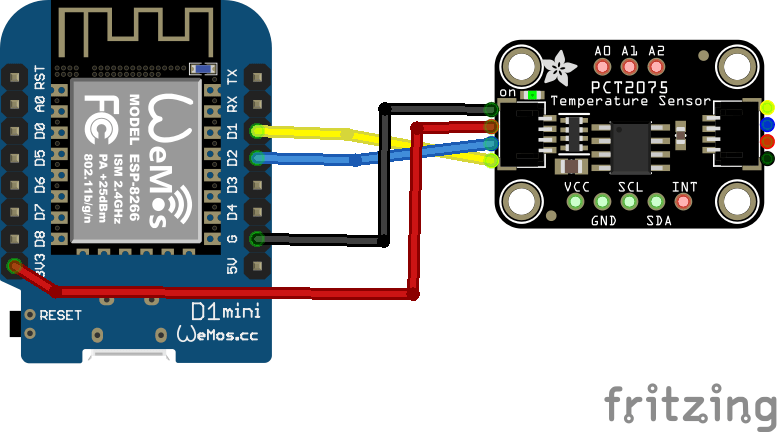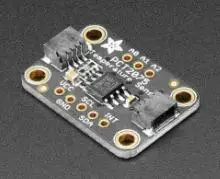In this article we look at a PCT2075 temperature-to-digital converter and we will connect it to a Wemos Mini
First lets look at the sensor
The PCT2075 is a temperature-to-digital converter featuring ±1 °C accuracy over ‑25 °C to +100 °C range. It uses an on-chip band gap temperature sensor and Sigma-Delta A‑to‑D conversion technique with an over temperature detection output that is a drop-in replacement for other LM75 series thermal sensors.
The device contains a number of data registers: Configuration register (Conf) to store the device settings such as device operation mode, OS operation mode, OS polarity and OS fault queue; temperature register (Temp) to store the digital temp reading, set-point registers to store programmable over temperature shutdown and hysteresis limits, and programmable temperature sensor sampling time, that can be communicated by a controller via the 2-wire serial I²C-bus Fast-mode Plus interface.
The PCT2075 also includes an open-drain output (OS) which becomes active when the temperature exceeds the programmed limits.
The OS output operates in either of two selectable modes: OS comparator mode or OS interrupt mode.
Its active state can be selected as either HIGH or LOW. The fault queue that defines the number of consecutive faults in order to activate the OS output is programmable as well as the set-point limits.
The PCT2075 can be configured for different operation conditions. It can be set in normal mode to periodically monitor the ambient temperature, or in shut-down mode to minimize power consumption.
The temperature register always stores an 11-bit two’s complement data, giving a temperature resolution of 0.125 °C. This high temperature resolution is particularly useful in applications of measuring precisely the thermal drift or runaway.
When the device is accessed the conversion in process is not interrupted and accessing the device continuously without waiting at least one conversion time between communications will not prevent the device from updating the Temp register with a new conversion result.
The new conversion result will be available immediately after the Temp register is updated. It is also possible to read just one of the temperature register bytes without lock-up.
The PCT2075 powers up in the normal operation mode with the OS in comparator mode, temperature threshold of 80 °C and hysteresis of 75 °C, so that it can be used as a stand-alone thermostat with those pre-defined temperature set points.
The default set points can be modified during manufacture and ordered under custom part number.
There are three selectable logic address pins with three logic states so that 27 8-pin devices or three 6-pin devices can be connected on the same bus without address conflict.
This is the sensor that I bought
Parts List
Here are the parts I used
| Name | Links | |
| Wemos Mini | ||
| PCT2075 | ||
| Connecting cables |
Schematic/Connection
I used the Adafruit PCT2075 sensor and in this case used the Stemma connection on the sensor
For the STEMMA QT cables, it uses the Qwiic convention:
Black for GND
Red for V+
Blue for SDA
Yellow for SCL
So color coded for ease of use, this layout shows a connection to the module

Code Example
This uses the library from Adafruit installed using the Library Manager in the Arduino IDE. search for PCT2075, and select the Adafruit PCT2075 library and also the Adafruit BusIO library
This is the default example
#include <Adafruit_PCT2075.h>
Adafruit_PCT2075 PCT2075;
void setup()
{
PCT2075 = Adafruit_PCT2075();
Serial.begin(115200);
// Wait until serial port is opened
while (!Serial) { delay(1); }
Serial.println("Adafruit PCT2075 Test");
if (!PCT2075.begin())
{
Serial.println("Couldn't find PCT2075 chip");
while (1);
}
Serial.println("Found PCT2075 chip");
}
void loop()
{
Serial.print("Temperature: ");
Serial.print(PCT2075.getTemperature());
Serial.println(" C");
delay(1000);
}
Output
Open the serial monitor and you should see something like this.
Temperature: 18.25 C
Temperature: 20.87 C
Temperature: 23.25 C
Temperature: 25.12 C
Temperature: 26.25 C
Links


